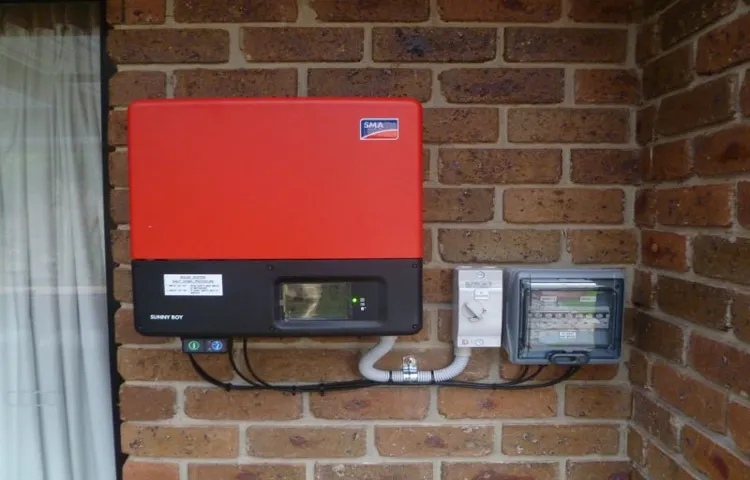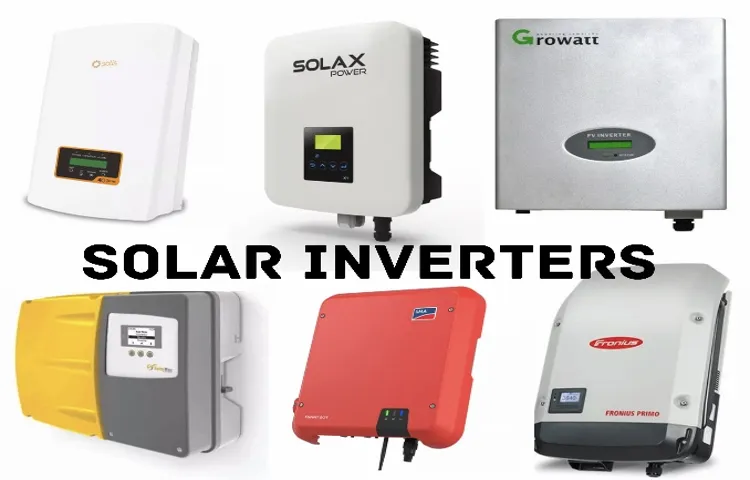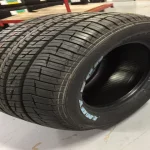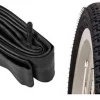Are you considering switching to solar power for your home or business? If so, you’ll need a solar power inverter. But with so many options available, how do you know which one is the best for your needs? Don’t worry, we’ve got you covered. In this comprehensive guide, we will walk you through everything you need to know about choosing the best solar power inverters.
Solar power inverters are an essential component of any solar power system. They convert the direct current (DC) energy generated by solar panels into alternating current (AC) energy that can be used to power appliances and electronics in your home or business. Without a reliable inverter, your solar panels would be useless.
The best solar power inverters offer high efficiency, durability, and reliability. They are designed to withstand harsh weather conditions and provide stable and consistent power output. When choosing a solar power inverter, you’ll need to consider factors such as the type of inverter, power rating, warranty, and additional features.
In this guide, we will explore the different types of solar power inverters, including string inverters, micro-inverters, and power optimizers. We will discuss the pros and cons of each type and help you determine which one is best suited for your specific needs. Additionally, we will provide tips on how to choose the right power rating for your inverter and what to look for in terms of warranty and additional features.
By the end of this guide, you’ll have a clear understanding of what to look for when shopping for the best solar power inverters. Whether you’re a homeowner looking to reduce your carbon footprint or a business owner hoping to cut down on electricity costs, investing in a high-quality solar power inverter is a smart choice. So let’s dive in and find the perfect inverter for your solar power system.
Table of Contents
Introduction to Solar Power Inverters
If you’re considering installing a solar power system for your home or business, you’ll need a solar power inverter. This essential component converts the direct current (DC) electricity generated by your solar panels into alternating current (AC) electricity that can be used to power your appliances and electronics. But with so many options available, you might be wondering, “what is the best solar power inverter?” The answer to that question depends on various factors such as the size of your solar power system, your budget, and any specific requirements you may have.
Some popular brands to consider are Enphase, SMA, and SolarEdge, which are known for their reliability and efficiency. It’s also important to choose an inverter that is compatible with your solar panel system and offers good warranty coverage. Ultimately, the best solar power inverter for you will be one that meets your specific needs and fits within your budget.
What is a solar power inverter?
solar power inverter, solar energy system

Why are solar power inverters important?
solar power inverters, importance, renewable energy, electricity, efficiency. In the world of renewable energy, solar power has emerged as one of the most popular and widely used sources. The sun’s energy is harnessed through the use of solar panels, which then transforms it into usable electricity.
But there’s more to the process than just harnessing the energy. Solar power inverters play a crucial role in this whole system. Think of them as the translators, converting the direct current (DC) produced by the solar panels into alternating current (AC) that can be used to power our homes and businesses.
Without these inverters, all that clean, renewable energy would be wasted, sitting in our solar panels and not being put to use.
Factors to Consider when Choosing a Solar Power Inverter
When it comes to choosing the best solar power inverter for your needs, there are several factors to consider. One important factor is the power output of the inverter. You’ll want to make sure that the inverter you choose can handle the maximum power load of your solar panels.
Another factor to consider is the efficiency of the inverter. A more efficient inverter will convert more of the DC power generated by your solar panels into usable AC power for your home. Additionally, it’s important to consider the reliability and lifespan of the inverter.
You’ll want to choose a reputable brand with a good track record for durability and longevity. Finally, take into account any special features or additional capabilities that may be important to you, such as built-in monitoring systems or the ability to easily expand your solar system in the future. By considering these factors and doing thorough research, you can find the best solar power inverter for your specific needs.
Efficiency
solar power inverter
Power Output
solar power inverter, power output, factors to consider
Reliability and Durability
solar power inverter, reliability, durability, factors to consider
Monitoring and Control Features
solar power inverter, monitoring and control features. When choosing a solar power inverter, there are several important factors to consider, especially when it comes to monitoring and control features. One factor to look for is the ability to remotely monitor and control your solar power system.
This means being able to access and control the inverter settings and performance data from your smartphone or computer. This is especially useful for keeping track of the system’s performance and making adjustments as needed. Another important feature to consider is the ability to monitor and control individual solar panels or strings of panels.
This allows for more precise monitoring and troubleshooting of potential issues. Additionally, it’s important to consider whether the inverter has built-in monitoring and control capabilities or if it requires a separate monitoring system. Having the monitoring and control features integrated into the inverter can simplify the installation process and make it easier to use.
Overall, monitoring and control features are vital when choosing a solar power inverter as they provide the necessary visibility and control to optimize the performance of your solar power system.
Warranty and Support
Factors to Consider when Choosing a Solar Power Inverter
Top Solar Power Inverters in the Market
Looking for the best solar power inverter for your home? There are several top options on the market that can help you convert the sun’s energy into usable electricity. One of the top contenders is the Fronius Primo, which is known for its high efficiency and reliability. Another popular choice is the SMA Sunny Boy, which offers a wide range of models to suit different needs and budgets.
Additionally, the Enphase IQ7 microinverter is a great option for those looking for a more modular and flexible setup. Lastly, the SolarEdge HD-Wave inverter is known for its cutting-edge technology and advanced features. Overall, choosing the best solar power inverter will depend on factors such as your energy needs, budget, and specific requirements.
Inverter A: High Efficiency and Power Output
The solar power industry is booming, and with it comes a wide range of solar power inverters to choose from. One top-performing inverter in the market is Inverter A, known for its high efficiency and power output. Inverter A takes the DC electricity generated by solar panels and converts it into AC electricity, which can be used to power homes and businesses.
What sets Inverter A apart from others is its ability to maximize energy conversion, ensuring that as much solar power as possible is used to power your home. This high efficiency means that you can get the most out of your solar panels, reducing your reliance on grid electricity and potentially saving you money on your energy bills. Inverter A also boasts a high power output, meaning it can handle a large amount of electricity flowing through it.
This allows for the simultaneous use of multiple appliances and devices without any loss in performance. Whether you have a small residential solar system or a large commercial one, Inverter A is a reliable choice that will maximize the power and efficiency of your solar panels.
Inverter B: Reliable and Durable
solar power inverters, reliable, durable, top inverters in the market Paragraph: When it comes to solar power systems, the inverter is the unsung hero. It’s like the heart that pumps energy into your home. And if you want a reliable and durable inverter, look no further than Inverter B.
With its top-notch quality and exceptional performance, it has gained a reputation as one of the best solar power inverters in the market. Inverter B is built to last, designed to withstand the harshest weather conditions, and provides a steady and consistent power output. Whether it’s a sunny day or a cloudy one, you can rely on Inverter B to convert that solar energy into usable electricity for your home.
Its durability ensures that it will keep working efficiently, even after years of operation. So, if you’re looking for a solar power inverter you can trust, Inverter B is definitely worth considering.
Inverter C: Advanced Monitoring and Control Features
solar power inverters If you’re considering installing solar panels on your property, one crucial component you’ll need is a solar power inverter. This device plays a vital role in converting the direct current (DC) electricity produced by your solar panels into usable alternating current (AC) electricity that can power your home or be fed back into the utility grid. But not all solar power inverters are created equal.
Some offer basic functionality, while others go above and beyond with advanced monitoring and control features. These advanced inverters, such as Inverter C, offer homeowners a way to optimize their solar power system for maximum efficiency and savings. With features like real-time performance monitoring, remote access, and even built-in diagnostic tools, these inverters allow you to keep a close eye on the performance of your solar panels and make adjustments as needed.
Whether you’re a solar power enthusiast looking to get the most out of your system or simply want peace of mind knowing that your investment is working as intended, an advanced solar power inverter like Inverter C can help you achieve your goals. So, when you’re in the market for a top solar power inverter, be sure to consider one that offers these advanced monitoring and control features for the best solar experience.
Conclusion
In conclusion, choosing the best solar power inverter is not something to be taken lightly. It’s like finding the perfect dance partner – you need someone who can keep up with your moves, sync harmoniously with your rhythm, and be the life of the party. But fear not, solar enthusiasts! The answer lies in the incredible world of microinverters.
These magical devices possess all the qualities of a true dance maestro. With their compact size and individual optimization capabilities, they can gracefully transform the raw energy from the sun into a symphony of power for your home. Just like a talented dance partner, microinverters are always ready to adapt and perform at their best.
They continuously monitor each solar panel, making sure that no shade or cloudy day can ruin your groove. And with their ability to communicate and sync up seamlessly, you can be confident that your solar energy production will be as smooth as a well-coordinated team on the dance floor. So, while traditional string inverters may have served us well in the past, microinverters have taken the solar industry by storm, showing us that when it comes to converting solar energy, it’s the small, flexible, and synchronized dancers that steal the show.
In the end, the best solar power inverter is not just a piece of equipment, but a dance partner who knows how to move in perfect harmony with the sun. So, let microinverters be your Fred Astaire or Ginger Rogers, and watch as they lead you on a dazzling journey of clean, efficient, and reliable solar power. It’s time to shine on the dance floor of renewable energy!
Summary of key considerations
solar power inverters, best solar power inverters, top solar power inverters, key considerations for solar power inverters. Summary of key considerations: When it comes to choosing the best solar power inverters for your needs, there are a few key considerations to keep in mind. Firstly, it’s important to consider the efficiency of the inverter.
A higher efficiency rating means that the inverter will convert a greater percentage of the DC power from your solar panels into usable AC power for your home. Additionally, the size and power rating of the inverter should be matched to your specific solar panel installation. It’s also worth considering the warranty and reliability of the inverter.
Look for inverters from reputable manufacturers that offer longer warranties and have a track record of reliability. Finally, it’s a good idea to consider the monitoring and control capabilities of the inverter. Some inverters offer advanced monitoring features that allow you to track the performance of your solar system in real-time, while others may have smartphone apps that enable remote monitoring and control.
By keeping these key considerations in mind, you can choose the top solar power inverters that meet your specific needs and provide reliable and efficient power conversion for your solar panel installation.
Recommendation for the best solar power inverter
solar power inverter, best solar power inverter, recommendation for solar power inverter Introducing the Best Solar Power Inverters available in the market today! When it comes to harnessing the power of the sun, having a reliable and efficient inverter is crucial. A solar power inverter is responsible for converting the direct current (DC) energy produced by your solar panels into usable alternating current (AC) electricity for your home or business. It is an essential component that ensures you can make the most of your solar energy system.
One of the top recommendations for the best solar power inverter is the SMA Sunny Boy series. These inverters have been trusted by homeowners and installers alike for their exceptional performance and reliability. With advanced features such as integrated web connectivity, you can monitor your solar energy production in real-time from anywhere.
The SMA Sunny Boy inverters also offer high conversion efficiency, ensuring that you get the maximum output from your solar panels. Another popular choice is the Enphase Microinverter series. These compact inverters are known for their superior performance and scalability.
Unlike traditional string inverters, the Enphase Microinverters work independently for each individual solar panel, allowing for maximum power optimization and fault tolerance. With built-in monitoring capabilities, you can easily track the performance of each panel and identify any potential issues. For those interested in a hybrid solar power system, the SolarEdge HD Wave inverters are an excellent choice.
These inverters offer both grid-tied and battery backup capabilities, allowing you to store excess solar energy for later use. The SolarEdge HD Wave inverters are also known for their slim and lightweight design, making installation and maintenance a breeze. When choosing the best solar power inverter, it is essential to consider factors such as conversion efficiency, reliability, monitoring capabilities, and compatibility with your solar energy system.
Each of the mentioned inverters offers unique features and benefits, catering to different requirements and preferences. In conclusion, investing in a high-quality solar power inverter is crucial for the optimal performance of your solar energy system. Whether you opt for the SMA Sunny Boy series, Enphase Microinverter series, or SolarEdge HD Wave inverters, you can rest assured knowing that you have chosen a reliable and efficient solution.
FAQs
What is a solar power inverter?
A solar power inverter is a device that converts the direct current (DC) generated by solar panels into alternating current (AC) that can be used to power electrical devices in homes or businesses.
How does a solar power inverter work?
Solar power inverters work by converting the DC electricity produced by solar panels into AC electricity that can be used to power appliances and devices. They also help manage the flow of electricity between the solar panels and the electrical grid.
What types of solar power inverters are available?
There are several types of solar power inverters available, including string inverters, microinverters, and power optimizers. Each type has its own advantages and considerations, such as cost, efficiency, and compatibility with different types of solar panel systems.
What are the key features to consider when choosing a solar power inverter?
When choosing a solar power inverter, it is important to consider factors such as efficiency, reliability, warranty, compatibility with your solar panel system, and any additional features or capabilities that are important to you, such as remote monitoring or grid-tie functionality.
Can a solar power inverter be used off-grid?
Yes, solar power inverters can be used off-grid in standalone systems that are not connected to the electrical grid. In this case, the inverter would typically be coupled with a battery bank to store excess electricity generated by the solar panels for use during times when the sun is not shining.
Are all solar panels compatible with any solar power inverter?
No, not all solar panels are compatible with any solar power inverter. It is important to ensure that the inverter you choose is compatible with the specific type and specifications of your solar panels. Some inverters may have limitations or requirements regarding voltage, current, or panel configuration.
Can a solar power inverter be installed outdoors?
Yes, many solar power inverters are designed for outdoor installation. However, it is important to choose an inverter that is specifically rated for outdoor use to ensure durability and protection against moisture, temperature fluctuations, and other environmental factors.



